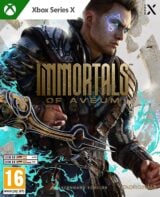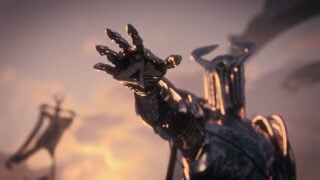Interview: How Immortals of Aveum brings CoD bombast to the fantasy realm
Game director Brett Robbins tells VGC how his years on Call of Duty and Dead Space influenced his new title

What if you were playing a level in a Call of Duty campaign, and then a dragon started chasing you down the street?
This was the daydream Brett Robbins had when working on one of the several campaigns he led for Activsion’s mega franchise.
Robbins, a veteran of the industry, previously served as the creative director on EA‘s Dead Space, the landmark horror shooter from the early Xbox 360 period which received a loving remake earlier this year. Prior to this, he worked at Crystal Dynamics on The Legacy of Kain and Gex.
Following his time at Sledgehammer, where he worked on the campaigns for Modern Warfare 3, Advanced Warfare and WWII, Robbins sought to make his idea a reality. A new studio, Ascendant, was born.
“I started working on Immortals of Aveum several years ago when I was working on Call of Duty as the creative director,” he tells us. “The idea of doing a magic shooter was something that was just kicking around in my head for a long time.
“It seemed like the type of game that I’d really like to play. I love fantasy games. I love shooters. Most fantasy games were more slow-paced RPG-style games. And it just seemed to me like a missed opportunity that no one was really making anything like that.”
Immortals of Aveum follows Jak, a Battlemage who discovers that he possesses magic powers later in life. Using these powers, players will embark on a lengthy single-player campaign to save the world.
Our first question after seeing a long portion of gameplay was simple. We know how a gun shoots, we’ve done it hundreds of times, but how does magic feel?
“It’s a tricky balance, because there’s a lot of history with shooters, and how a gun should look and feel,” Robbins replies. “We were reinventing that because we wanted to do all of our combat with spellcasting. We really had to experiment for a long time and figure out what felt right.
“I think we went down some roads that were very experimental, but interesting, but ended up ultimately being a little too complicated or too unintuitive for people.
“The takeaway I had from working on Call of Duty was that the combat had to feel great, it had to run at a high frame rate and the controls had to feel intuitive.
“I think we really managed to strike that balance of creating something that people will understand almost immediately, but then start to learn that there’s a lot more to it than a standard shooter, and that there are a lot of interesting abilities and things like that. So I feel like we’ve walked that line pretty well.”
While a first-person magic game isn’t entirely revolutionary, with games like Tango Gameworks‘ recent effort Ghostwire Tokyo adopting a similar mechanic on the surface, Robbins’ days in the Call of Duty trenches led to the team thinking about the real-world mechanics of magic as deeply as if it were a Dragunov sniper rifle.
“It was difficult, because we’ve seen that magic sometimes doesn’t feel as good as a gun,” Robbins explains. “We all understand what a gun feels like and how it should shoot, you know? Inventing what a spell feels like a difficult thing to do.
“It actually reminded me quite a bit of my time working on Dead Space, because, in Dead Space, we had made the decision that Isaac was an engineer and all of his weapons were going to be tools. So it was ‘how do you make a tool feel interesting and powerful’?
“In this case, it was ‘how do we make a spell feel interesting and powerful’. We do certainly have analogues to guns with our spells. We have a fire spell that feels like a shotgun. But there’s always a twist or something about it that makes it magical and feel a little bit different.
“We do certainly have analogues to guns with our spells. We have a fire spell that feels like a shotgun. But there’s always a twist or something about it that makes it magical and feel a little bit different.”
“And then we had a lot of fun developing the sigils, where you focus all your power through. The player can find lots of different sigils that change how the spells behave, or that have different bonuses or buffs to them.
“So, we have things that are analogous, but we’ve put our own spin on them, as far as what people expect out of a shooter.”
Another key area of influence that Immortals of Aveum takes from Call of Duty is in the scale and big-budget glamour of the campaign itself. From what we were shown, the game, which is being built in Unreal 5, is a real looker.
But beyond that, was the team looking to emulate Call of Duty’s love for taking influence from film and TV while building Immortals?
“Working on Call of Duty campaigns really taught me how to create a big spectacle,” Robbins replies. “You’re really making a summer blockbuster when you make a Call of Duty campaign. I wanted to bring that into Immortals of Aveum.
“You’re right, in Call of Duty we’d lift sections from a movie or a TV show, but I didn’t do that for Immortals. We are trying to create something you haven’t seen before.

“We had a huge canvas to paint on in terms of being able to do whatever we wanted to we were creating the world. We’re creating the rules of magic as we went, and it allowed for a lot of different opportunities.
“That being said, you know, you can almost have too much freedom, we had to put in some guidelines and some guardrails for what the world would be. If you don’t have those things. Things can just sort of become nonsense. So we needed to make sure the world felt consistent and believable at all times.”
In the past few years there’s been a discussion in the larger media landscape about dialogue in big, mainstream games and films. ‘Marvel snark’ is a term coined in film circles to reference the (rather unfair) assumption that all superhero films use the same irreverent dialogue.
This conversation made it to the video game space earlier this year with the release of Forspoken, an action game from Square Enix in which a woman from the modern-day world is thrust into a fantasy setting.
“I made a decision very early on that we were going to have a very different tone to a fantasy game,” Robbins tells us.
“This wasn’t going to be Lord of the Rings, this wasn’t going to be people speaking in Old English. These are modern, relatable characters set in a fantasy world. I think our tone is something that really is going to set us apart quite a bit.
“This wasn’t going to be Lord of the Rings, this wasn’t going to be people speaking in Old English. These are modern, relatable characters set in a fantasy world. I think our tone is something that really is going to set us apart quite a bit.”
“We wanted to sort of take fantasy tropes and turn them on their head a little bit. So my touchstone for the writing and for the storytelling is really more in the spirit of a Marvel movie.
“Something like Guardians of the Galaxy, or you know, an Avengers film where even though you’re in a fantastic setting, and incredible things are happening, you have very grounded, relatable characters. They speak in a way that we understand.
“It was a lot of fun to write that way, myself and my lead writer, Michael Kirkbride, we had a great time working together on the scripts and working with the cast. So I think we really created something that’s going to be very compelling, and relatable, and a lot of fun.”
One thing Immortals of Aveum hasn’t had is the typical marketing cycle associated with games of this scale, especially from a huge publisher like EA. While the game was announced at The Game Awards, it didn’t make the splash of some of the other announcements.
Coupling this with the fact that the game is being released only a few months after this re-reveal, we asked what the thought process was behind this curtailed hype cycle.

“We wanted to suddenly appear out of nowhere,” Robbins says. “I didn’t want people to have to wait for it. There are a lot of games and shows coming out, so keeping people’s interest over a long period of time can be difficult.
“I had no real interest in having ourselves be under the spotlight for a long period of time, I thought it was much more interesting to just get our heads down, do our work, and come up with the game. Make sure what we’re doing is something really interesting and compelling and then start to show it to the world.
“When I started the company and started the game, I knew that single-player was going to be a foundational piece of what we were making. I wasn’t sure if we’d also experiment with multiplayer or do other things. We have done some prototyping in various different ways.
“But I think my career has always been in single-player and strong narrative games. It’s what I’m familiar with, it’s what I enjoy making is what I enjoy playing. So I’m thrilled that I had the opportunity just to focus on that and make that as strong as can possibly be.”
Immortals of Aveum is released on PC, PlayStation 5, and Xbox Series X/S on July 20.


















